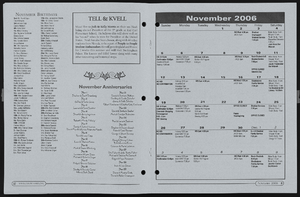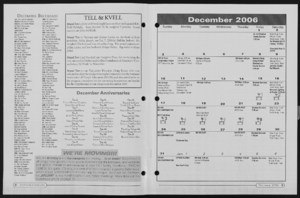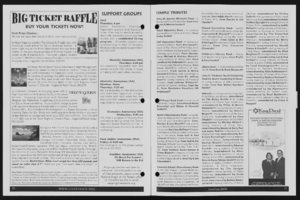Search the Special Collections and Archives Portal
Search Results

Daniel Tafoya oral history interview: transcript
Date
Archival Collection
Description
Oral history interview with Daniel Tafoya conducted by Laurents Bañuelos-Benitez and Barbara Tabach on December 12, 2018 for the Latinx Voices of Southern Nevada Oral History Project. In this interview, Tafoya discusses his early life in Albuquerque, New Mexico. He talks about his father's life story, his educational experience with learning disabilities, and joining the United States Air Force. Tafoya describes his career in the military, and being stationed at Nellis Airforce Base. Lastly, Tafoya discusses with involvement with the Clark County School District (CCSD) and with the Latin Chamber of Commerce.
Text

Transcript of interview with Elaine Cali McNamara by Claytee White and Stefani Evans, October 5, 2016
Date
Archival Collection
Description
This ability to greet each day with a challenge has laid the foundation for a long history of success for Elaine McNamara as she has navigated through local beauty pageants, an illustrious real estate career, serving on the Las Vegas-Clark County Library board during their decade of expansion to authorship. Her story of resilience starts when she became ill at approximately seven or eight with erythema nodosum that impeded her ability to walk for five months when she started collecting pictures of movie stars. Her favorite movies were any of Roy Rogers, Abbott and Costello, Dean Martin and Jerry Lewis. Her family moved to Las Vegas, where she attended Las Vegas High School as well as UNLV majoring in elementary education and minoring in language arts. While she attended high school, she studied modeling in the evenings to help overcome her shyness and to become more outgoing. Becoming more involved with local and state beauty pageants, she met the likes of Phyllis Diller, Natalie Wood,
Text

Transcript of interview with Jarmilla McMillan-Arnold by Claytee D. White, October 7, 2010
Date
Archival Collection
Description
Jarmilla McMillan-Arnold’s father, Dr. James B. McMillan, was the first black dentist in the state of Nevada. Dr. McMillan’s colleagues consisted of Dr. West, the first black medical doctor in the state, and Dr. Ice, the first black surgeon in Nevada. This interview highlights and archives the solid foundation upon which Nevada’s black community was built. Jarmilla recalls early memories of growing up as the daughter of Las Vegas NAACP president Dr. McMillan. She was born in Detroit, Michigan, to a Caucasian and Indian mother who was a professional dancer. Jarmilla’s parents separated when she was very young and as a result she was raised by her paternal grandmother who owned a restaurant in Pontiac, Michigan. Jarmilla describes her grandmother as being well-known and highly regarded in the community where she maintained her business. Jarmilla attended Catholic schools in Detroit, Pontiac, and Las Vegas. Having moved to Las Vegas with her father, Jarmilla’s narrative offers keen insigh
Text

Interview with Navor Tito Valdez, June 20, 2005
Date
Archival Collection
Description
Text

Transcript of interview with Renee Marchant Rampton by Dr. Caryll Batt Dziedziak, September 25, 2015
Date
Archival Collection
Description
Renee Marchant Rampton has often referred to herself as "One of Fifteen." Indeed, growing up in a family of fifteen children, Renee experienced the care of loving parents, the excitement of a bustling household, and the engagement of an active Church; all amidst the strains of a depression era economy. Renee's mother, Beatrice Marchant, provided Renee with a strong role model with which to emulate; a disciplined woman, who rose to the task without hesitation. Beatrice became the family's provider after her husband's debilitating stroke and later served in the Utah Legislature during the 1970s. Renee loved music from an early age. As a young child she found an early job as a piano accompanist for a dance studio. In 1956 she married musician, Roger Rampton, a successful percussionist. They soon settled in Las Vegas, where Roger performed on the Strip and they began raising their four children. It was an exciting period in Las Vegas history as the Strip attracted musicians and
Text

Transcript of interview with Charles W. Hunsberger by Stefani Evans and Claytee White, July 27, 2016
Date
Archival Collection
Description
It seems counterintuitive that a man who was raised a Mennonite, spoke Pennsylvania Dutch before he spoke English, and was destined to quit school after eighth grade to work on the family farm would grow up to become one of the most progressive and visionary library directors in the United States. His participation in the Building Las Vegas project results from his being responsible for building twenty libraries in Clark County during his 1971–1994 tenure as director of the Las Vegas-Clark County Library District. One of his first controversies was to insist on going to high school after his father demanded he quit. After graduating high school he went to Nigeria on behalf of his church, serving there for five years. Upon returning to the U.S., he found work at the Fort Wayne Library, albeit he was limited by how far he could advance because of his limited education. After attaining his library degree Indiana University at Bloomington he served as director at the Columbia City Library
Text

Transcript of interview with Patricia Ross by Judy Harrell, March 19, 2014
Date
Archival Collection
Description
Patty Ann Drew’s life experiences capture large movements in Las Vegas history: mob-dominated gambling, the Helldorado Rodeo, explosive growth, medical advances, and Clark County School District’s Sixth Grade Centers—all in a desert city centered in the Mormon Culture Region. Patty arrived in Las Vegas as an infant with her parents and older brothers in 1944 and was raised in the Huntridge area, where she and her brothers attended John S. Park Elementary School and matriculated from there to Las Vegas High School. In this interview, Patty talks about her parents working on the Strip, her school days, joining the Church of Jesus Christ of Latter-day Saints, marrying her high school sweetheart, and becoming a young mother in Las Vegas. After Patty married her second husband, Thomas Ross, the couple built a house west of Jones Boulevard and Patty gave birth to her third son. In addition, she returned to school to earn her Bachelor’s and Master’s degrees and taught at C. H. Decker Elementary School for twenty years.
Text



